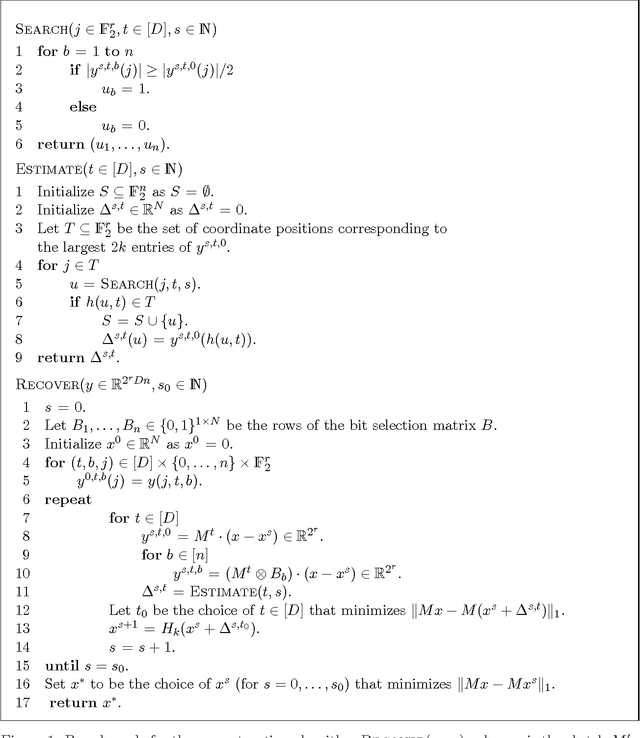Nearly Optimal Deterministic Algorithm for Sparse Walsh-Hadamard Transform
Paper and Code
Apr 28, 2015

For every fixed constant $\alpha > 0$, we design an algorithm for computing the $k$-sparse Walsh-Hadamard transform of an $N$-dimensional vector $x \in \mathbb{R}^N$ in time $k^{1+\alpha} (\log N)^{O(1)}$. Specifically, the algorithm is given query access to $x$ and computes a $k$-sparse $\tilde{x} \in \mathbb{R}^N$ satisfying $\|\tilde{x} - \hat{x}\|_1 \leq c \|\hat{x} - H_k(\hat{x})\|_1$, for an absolute constant $c > 0$, where $\hat{x}$ is the transform of $x$ and $H_k(\hat{x})$ is its best $k$-sparse approximation. Our algorithm is fully deterministic and only uses non-adaptive queries to $x$ (i.e., all queries are determined and performed in parallel when the algorithm starts). An important technical tool that we use is a construction of nearly optimal and linear lossless condensers which is a careful instantiation of the GUV condenser (Guruswami, Umans, Vadhan, JACM 2009). Moreover, we design a deterministic and non-adaptive $\ell_1/\ell_1$ compressed sensing scheme based on general lossless condensers that is equipped with a fast reconstruction algorithm running in time $k^{1+\alpha} (\log N)^{O(1)}$ (for the GUV-based condenser) and is of independent interest. Our scheme significantly simplifies and improves an earlier expander-based construction due to Berinde, Gilbert, Indyk, Karloff, Strauss (Allerton 2008). Our methods use linear lossless condensers in a black box fashion; therefore, any future improvement on explicit constructions of such condensers would immediately translate to improved parameters in our framework (potentially leading to $k (\log N)^{O(1)}$ reconstruction time with a reduced exponent in the poly-logarithmic factor, and eliminating the extra parameter $\alpha$). Finally, by allowing the algorithm to use randomness, while still using non-adaptive queries, the running time of the algorithm can be improved to $\tilde{O}(k \log^3 N)$.
 Add to Chrome
Add to Chrome Add to Firefox
Add to Firefox Add to Edge
Add to Edge